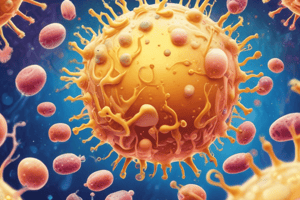Podcast
Questions and Answers
Which of the following bacteria is commonly associated with urinary tract infections and endocarditis?
Which of the following bacteria is commonly associated with urinary tract infections and endocarditis?
- Streptococcus
- Escherichia coli
- Enterococcus (correct)
- Staphylococcus
Which bacterium is known for causing skin infections such as boils and impetigo?
Which bacterium is known for causing skin infections such as boils and impetigo?
- Enterococcus
- Pseudomonas
- Staphylococcus (correct)
- Streptococcus
Which bacterium is known for its association with respiratory infections such as pneumonia and sinusitis?
Which bacterium is known for its association with respiratory infections such as pneumonia and sinusitis?
- Enterococcus
- Streptococcus (correct)
- Mycobacterium tuberculosis
- Staphylococcus
Which bacterium is commonly found on the skin and mucous membranes of humans and can cause food poisoning and toxic shock syndrome?
Which bacterium is commonly found on the skin and mucous membranes of humans and can cause food poisoning and toxic shock syndrome?
Which bacterium is responsible for causing infections in both humans and animals, including mastitis in dairy cows and wound infections in humans?
Which bacterium is responsible for causing infections in both humans and animals, including mastitis in dairy cows and wound infections in humans?
Which bacterium is commonly associated with causing infections in hospital settings, including bloodstream infections, surgical wound infections, and urinary tract infections?
Which bacterium is commonly associated with causing infections in hospital settings, including bloodstream infections, surgical wound infections, and urinary tract infections?
Which bacterium is known for its ability to develop resistance to antibiotics, making it challenging to treat infections caused by this pathogen?
Which bacterium is known for its ability to develop resistance to antibiotics, making it challenging to treat infections caused by this pathogen?
Study Notes
Bacterial Associations
- E. coli is commonly associated with urinary tract infections and endocarditis.
Skin Infections
- Staphylococcus aureus is known for causing skin infections such as boils and impetigo.
Respiratory Infections
- Streptococcus pneumoniae is known for its association with respiratory infections such as pneumonia and sinusitis.
Skin and Mucous Membranes
- Staphylococcus aureus is commonly found on the skin and mucous membranes of humans and can cause food poisoning and toxic shock syndrome.
Infections in Humans and Animals
- Staphylococcus aureus is responsible for causing infections in both humans and animals, including mastitis in dairy cows and wound infections in humans.
Hospital-Acquired Infections
- Staphylococcus aureus is commonly associated with causing infections in hospital settings, including bloodstream infections, surgical wound infections, and urinary tract infections.
Antibiotic Resistance
- Staphylococcus aureus is known for its ability to develop resistance to antibiotics, making it challenging to treat infections caused by this pathogen.
Studying That Suits You
Use AI to generate personalized quizzes and flashcards to suit your learning preferences.
Description
Test your knowledge of bacterial infections with 30 multiple-choice questions focusing on Staphylococcus, Enterococcus, and Streptococcus bacterias. Each question comes with a detailed explanation of the correct answer to help you understand these common pathogens.





